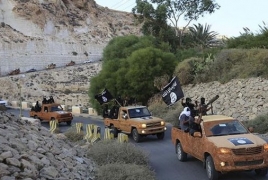
The Islamic State militants who control the Libyan city of Surt (Sirte) are resorting to mass beheadings, public crucifixions and other stark displays of brutality as they seek to crush an insurrection, the Foreign Minister of Libya’s internationally recognized government said Tuesday, Aug 18, at a meeting of Arab diplomats, the New York Times reports.
Mohamed el-Dayri, cited the violence in an appeal to the member states of the Arab League for military intervention against the group, also known as ISIS or ISIL.
“Can Libyans now stop this flood in Surt represented by the Islamic State? I say the answer is no,” Dayri told the assembled Arab delegates in Cairo, arguing that a weapons embargo imposed by the United Nations Security Council at the start of the uprising against Col. Muammar Gaddafi five years ago was now depriving the recognized government of “the most basic needs” in weaponry.
Others, though, argued that the struggle by the Islamic State to maintain its control of Surt also underscored the natural limits on the group’s expansion amid the Libyan chaos. The group was forced out of the eastern Libyan city of Derna this spring by a feud with a rival Islamist militia, and now one of the largest tribes in Surt, its remaining stronghold, has also risen against it.
“Everything in Libya is hyperlocalized, and that holds true for ISIS as well,” said Frederic Wehrey, a researcher on Libya at the Carnegie Endowment for International Peace. “There is only so far it can expand because it bumps up against these same forces.”
Over the last two years, both Egypt and the United Arab Emirates have initiated limited interventions inside Libya, both treating the fighting there as part of broader regional conflict with the forces of political Islam.
A rebel provisional government in exile made a similar request to the Arab League five years ago for help to oust Colonel Gaddafi, and the league’s statement of support set the stage for the NATO airstrikes that ended his rule.
The collapse of the Gaddafi government and the looting of its armories, however, left Libyans at the mercy of fractious local militias that emerged in the aftermath.
The United States, Britain, France, Germany, Italy and Spain recently issued their own statement expressing deep concern about “the deplorable developments” in Surt, citing reports of the Islamic State’s “indiscriminate acts of violence to terrorize the Libyan population.”

